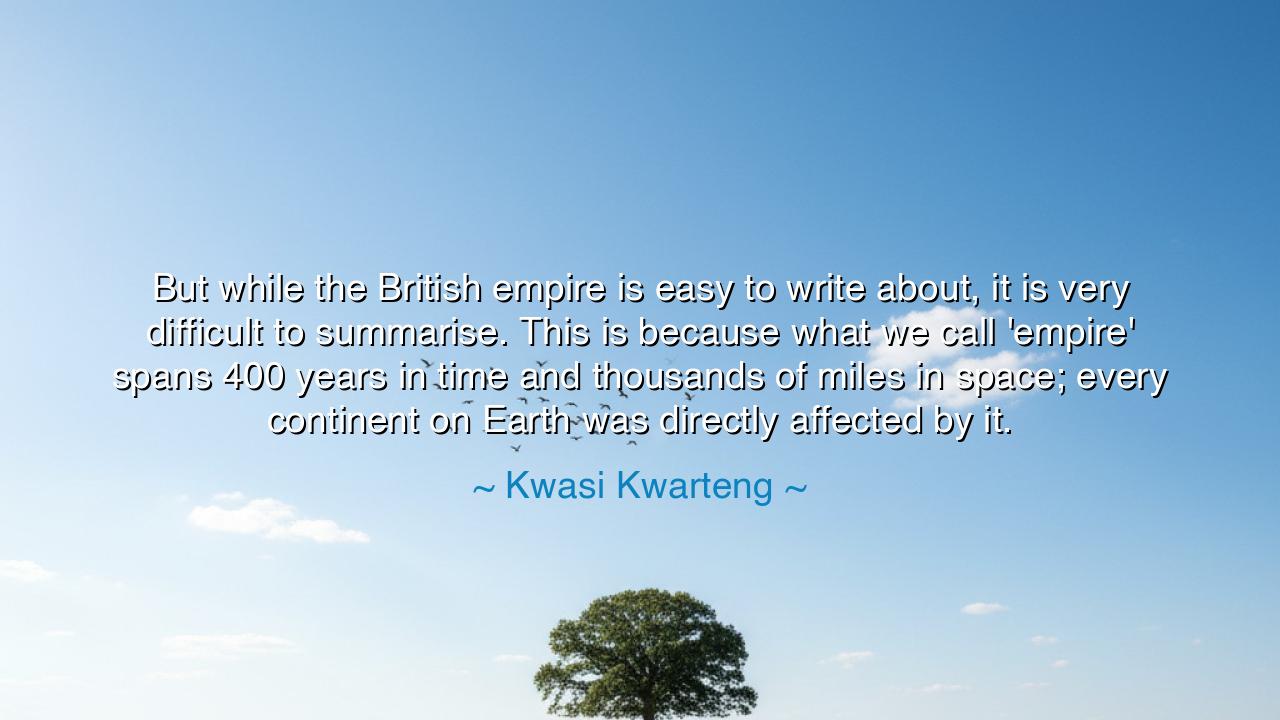
But while the British empire is easy to write about, it is very
But while the British empire is easy to write about, it is very difficult to summarise. This is because what we call 'empire' spans 400 years in time and thousands of miles in space; every continent on Earth was directly affected by it.






Hear, O children of history, the solemn words of Kwasi Kwarteng, who declared: “But while the British empire is easy to write about, it is very difficult to summarise. This is because what we call ‘empire’ spans 400 years in time and thousands of miles in space; every continent on Earth was directly affected by it.” These words resound with the weight of centuries, for they remind us that empire is not a tale easily told. It is not a single story, but a vast sea of triumphs and tragedies, stretching across ages and lands, leaving marks upon every people it touched.
The origin of this saying lies in the long shadow of the British empire, which rose from a small island kingdom and extended its hand across the globe. It planted its flags in Africa, Asia, the Americas, and the Pacific, weaving a network of trade, conquest, and governance that reshaped the very face of the earth. Its ships sailed every ocean, its armies marched on foreign soil, and its language, laws, and culture left an imprint still visible today. Yet, as Kwarteng warns, to speak of “the empire” as if it were a single thing is to mistake the vastness for simplicity, for it was both a force of creation and destruction, of order and of cruelty.
Consider, for example, the story of India, jewel of the empire. For centuries, Britain drew wealth from its soil, reshaped its governance, and imposed its will upon its people. The railways, courts, and schools that remain were born in this age, but so too was famine, poverty, and rebellion. Millions suffered under foreign rule, and yet from that suffering rose the fire of resistance. In the twentieth century, Mahatma Gandhi wielded the weapon of nonviolence, and the empire that had endured for centuries began to crumble. This single story shows why the empire is so difficult to summarise: it was both builder and destroyer, oppressor and midwife of freedom.
Or look to Africa, where borders drawn by imperial hands divided peoples and sowed conflicts that linger to this day. The Scramble for Africa, in which European powers carved the continent like a feast, left behind wounds of division, exploitation, and resentment. And yet, in some places, institutions, roads, and infrastructure remain as legacies of that age. Here again we see the truth of Kwarteng’s words: to call all this simply “empire” is to simplify what cannot be simplified. It was too vast, too contradictory, too filled with both light and shadow.
Even in Britain itself, the empire shaped identities. For generations, Britons saw themselves as rulers of a world-spanning dominion, their pride tied to the seas they commanded. But as the empire fell, the nation was forced to reckon with its legacy—its glories, yes, but also its guilt. This struggle of memory continues, as statues are debated, histories are rewritten, and the meaning of empire is contested. Here lies the difficulty of summarising: the empire was not only out there, in distant lands, but within the hearts of its own people, shaping how they saw themselves and others.
Thus, O listener, the lesson is clear: when we speak of empire, let us do so with humility. Let us not be quick to reduce centuries and continents into simple words of praise or blame. Instead, let us see with wide eyes the complexity of history, the interweaving of good and evil, of power and suffering, of legacies both bitter and fruitful. For to ignore this complexity is to dishonor the millions whose lives were shaped, uplifted, or broken by it.
Practical action lies before you. When you study history, do not be content with easy answers. Read widely, listen to the voices of those who were ruled as well as those who ruled. Remember that the story of empire is not only the story of kings and generals, but of villagers, workers, slaves, and rebels, who bore its weight in their daily lives. In this way, you will learn not just facts, but wisdom, and be able to judge the present with clearer sight.
So remember the teaching of Kwasi Kwarteng: the British empire cannot be easily summarised, for it touched all lands and all peoples, shaping the very world we live in today. Let this truth humble you, broaden your vision, and guide you to seek justice and understanding in your own time, for the echoes of empire still sound, and its lessons remain to be learned.






AAdministratorAdministrator
Welcome, honored guests. Please leave a comment, we will respond soon